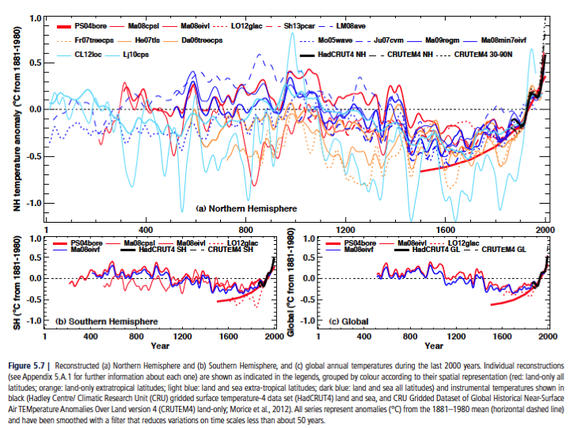 Bishop Hill
Bishop Hill We forgot the geography!
 Dec 18, 2015
Dec 18, 2015  Climate: Oceans
Climate: Oceans  Climate: Surface
Climate: Surface  The British Medical Journal recently held a Q&A on climate science with, among others, Brian Hoskins. The results are paywalled, but I was amused by the excerpt from the start of the session in response to a question about why Antarctic sea ice is growing:
The British Medical Journal recently held a Q&A on climate science with, among others, Brian Hoskins. The results are paywalled, but I was amused by the excerpt from the start of the session in response to a question about why Antarctic sea ice is growing:
The anomaly in the Antarctic is due to its geography. Unlike in the Arctic, where the extent of sea ice is constrained by the North American and Eurasian land masses, Antarctic sea ice forms in the open ocean with less land constraining its formation. Antarctic sea ice is also thinner and mostly melts each summer, whereas Arctic sea ice survives longer (although the amount of sea ice lasting more than two years has declined rapidly since 1979).
If the growth is "due to its geography" you have to wonder why the climate models predicted a decrease. Perhaps climate modellers forgot to put the geography in?
 Bishop Hill
Bishop Hill
A reader sends a copy of the full text. This is a shocker. Take this on the little ice age, for example:
The Little Ice Age was particularly apparent in the European region but didn’t represent a major decline in temperatures globally. It was probably caused by a decline in solar output in the second half of the 17th century (known as the Maunder minimum) and a higher level of volcanic activity. These factors cannot account for the long term global warming observed since industrialisation because there has not been a long term increase in solar output or a decline in volcanic activity of the necessary magnitude.
And here's the IPCC's take on the millennial temperature reconstructions, with the Little Ice Age clearly visible in the Northern Hemisphere, the Southern Hemisphere and the global data:
Or what about the BMJ take on climate sensitivity?
A more recent study, based on inserting observed values in a very simple model, estimated the short
term warming to be 1.05-1.80°C. Although the upper end of this estimate is lower than that of the IPCC report, the study’s findings still mean that it would only increase the time taken to reach a given level of warming by a few years. Thus, while there are uncertainties about the precise relation between increases in the rate and concentration of atmospheric CO2 with the rate of global warming, these uncertainties have relatively little bearing on what we need to do in terms of climate policy.
The insinuation that this paper (Lewis and Curry) is an outlier is of course grossly misleading, while the use of 5-95% ranges to hide the huge differences between the GCMs and the observational estimates is straight out the Myles Allen "dirty tricks" book.
In related news, it turns out that one of Hoskins' co-authors is a fan of Stefan Lewandowsky. Go figure.




Reader Comments (59)
We should give much more weight to Ken Rice's opinions. Search for "Ken Rice" and "astrophysics", and prepare to be amazed.
Imagine you went up to Edinburgh and found Ken Rice.
£9,000 pa??
Students considering Edinburgh University for Astrophysics should read all of aTTP's postings.
aTTP ( Ken Rice ) postings are driving applications for astrophysics at Edinburgh University.
Cheers, Ken.
@jolly farmer: Climate Alchemists failed to do the most basic check when they assumed 'black body surface IR' shines through the atmosphere which absorbs the difference of it and 'Outgoing Longwave Radiation'. With no clouds this implies 40% higher solar heating than reality, greater for a cloudy atmosphere: the assumption is, therefore, wrong.
To keep the funding, they then spent 40 years developing modelling complexity to hide this error.
Hoskins is of course, head of the Imperial College version of the Grantham institute, of which Professor Joanna Haigh is co-director. https://www.imperial.ac.uk/grantham/about-us/our-people/
He is an Emeritus Professor of Meteorology at Reading: http://www.met.reading.ac.uk/users/users/128.
The joint advisory board is an interesting list, including Sir Evelyn de Rothschild, Fred Krupp, President, US Environmental Defense, Paul Nurse, Keith Onions and Lord Rees, Carter Roberts, President and CEO WWF US, Schellnhuber and Stern, together with Sam Fankhauser of the Climate Change Committee, of which Hoskins is also a member. Lets not forget Lord Browne, formerly BP and now Cuadrilla, formerly on Deutsche Bank Climate Advisory board with Pachauri and Schellnhuber.
Grantham funds both ED and WWF in the US. Both Roberts and Krupp are on half million dollar per annum remuneration.
http://www.lse.ac.uk/GranthamInstitute/about/about-the-institute/advisory-board/
Roger - I pop over now and again but don't have the time to keep up with all your efforts, (and tbh the planetary orbital cycles just bamboozle me) so thanks for posting the links here. It is a very good correlation isn't it.
I wish I had a job where I was allowed to waste my employer's money responding at length to blogs all day.
aTTP, you could really gain some respect by detailing your 'issues' with Mann's Hockey Stick.
Obviously the Hockey Team would label you as a denier and ostracise you, for daring to question the consensus opinions of proper climate scientists, but it would give you the opportunity to form your own impression of the quality of the science and scientists you don't criticise, before you slag off anybody else.
@GC
Not. A. Chance.
The Antarctic is a large unmoving continental land mass (with some very cold high elevation areas), mostly covered in ice surround by highly mobile oceans.
In contrast the Arctic polar ice-cap is a mobile ice mass floating in the relatively slow moving sea, and surrounded with near-by land.
The British Medical Journal seems to be setting itself up as a major source of Climatic mis-information, following its many successes in the Medical field.